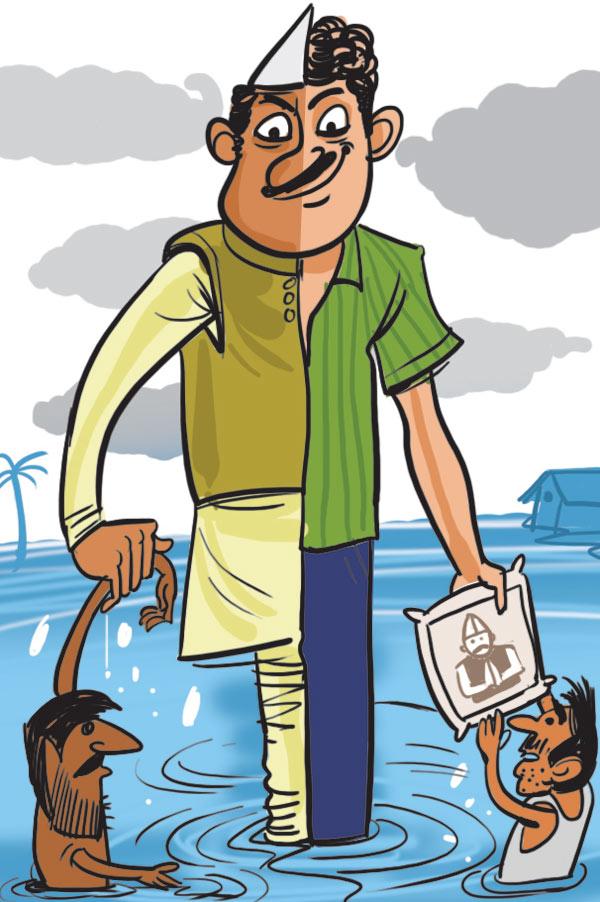Most of us want to be good. Or believe we are basically good people. A lot of our time, especially in social analysis, when stripped of its varied intellectual dresses, is spent assessing the goodness of people and institutions — politicians, movie stars, businesses

 Most of us want to be good. Or believe we are basically good people. A lot of our time, especially in social analysis, when stripped of its varied intellectual dresses, is spent assessing the goodness of people and institutions — politicians, movie stars, businesses.
Most of us want to be good. Or believe we are basically good people. A lot of our time, especially in social analysis, when stripped of its varied intellectual dresses, is spent assessing the goodness of people and institutions — politicians, movie stars, businesses.

ADVERTISEMENT
It is assumed that we all know what goodness is. It seems to resides in self-abnegation, self-sacrifice and minimising the self. It is an undiluted thing, pure as pure ghee. Cows may disagree with the goodness of this purity, but ghee whiz let’s not get too technical with the metaphor stuff here.
For instance, if a commercial organisation does something to help the flood affected in Chennai, should it publicise the fact? Does it mean the company is building brand value while pretending to be good, preying on other people’s misfortune to construct a feel-good image for itself? If it wasn’t actually having an effect, this would be a no-brainer.
But, what if it is actually helping people and also building brand value? Would it still be good? For some, no, because they believe only that which is uncontaminated by self-interest is good.
Can self-interest never co-exist with goodness? Does goodness only come if you forego something or can it co-exist with gain?
For instance, online food ordering service Zomato proposed that you could use their portal to buy a meal for Chennai. For every meal you bought, they would contribute one meal. This may have increased their business — but it also increased help for flood affected, and gave people a simple way to contribute. While Zomato would certainly leverage their contribution for a positive brand story, one could argue that the labour of managing the contributions would even out the gain to an extent. Was it okay for Zomato to make a profit and help others? Did this reveal a kind of opportunism or simply a way of doing something helpful without giving anything up? For some it’s not a simple answer.
For others it is. For those who consider any relationship between self-interest and goodness an illicit one, this is not pure enough. Whether meals reach people or not — which might be a simple index, for me — it’s simply not good. There is a pre-determined script of exploitation between haves and have-nots in this view, and this precludes goodness. Whether looking at everything through the single window of one’s ideology is goodness or self-interest, is hard to say, and risky to ask.
On the other hand, sex workers from Maharashtra gave up one meal each and with the money they saved from that, gathered one lakh rupees to send to the flood affected of Chennai.
For most, this would be good because it involved sacrificing something. Even those who stigmatise sex workers, thus keeping them a poor and vulnerable population, would grudgingly admit the goodness here. They will continue to stigmatise sex work, unable to accord it rights, while lauding the sacrifice.
For me, this contribution is goodness not because it reveals self-sacrifice, but because it reveals self-respect. It shows that those who do not have much may not simply see themselves as have-nots. They are able to sidestep these locked scripts of goodness and self-interest to see that having and giving are relative and so reach out to help. It is a pragmatic rather than melodramatic view of the world.
Much of our definition of goodness comes from ideas of giving up the world, rather than finding ways to co-exist in it more fairly and flexibly. Sometimes the casteist eye that critiques everything for purity inadvertently ends up being the most uncharitable.
Paromita Vohra is an award-winning Mumbai-based filmmaker, writer and curator working with fiction and non-fiction. Reach her at www.parodevipictures.com
 Subscribe today by clicking the link and stay updated with the latest news!" Click here!
Subscribe today by clicking the link and stay updated with the latest news!" Click here!







